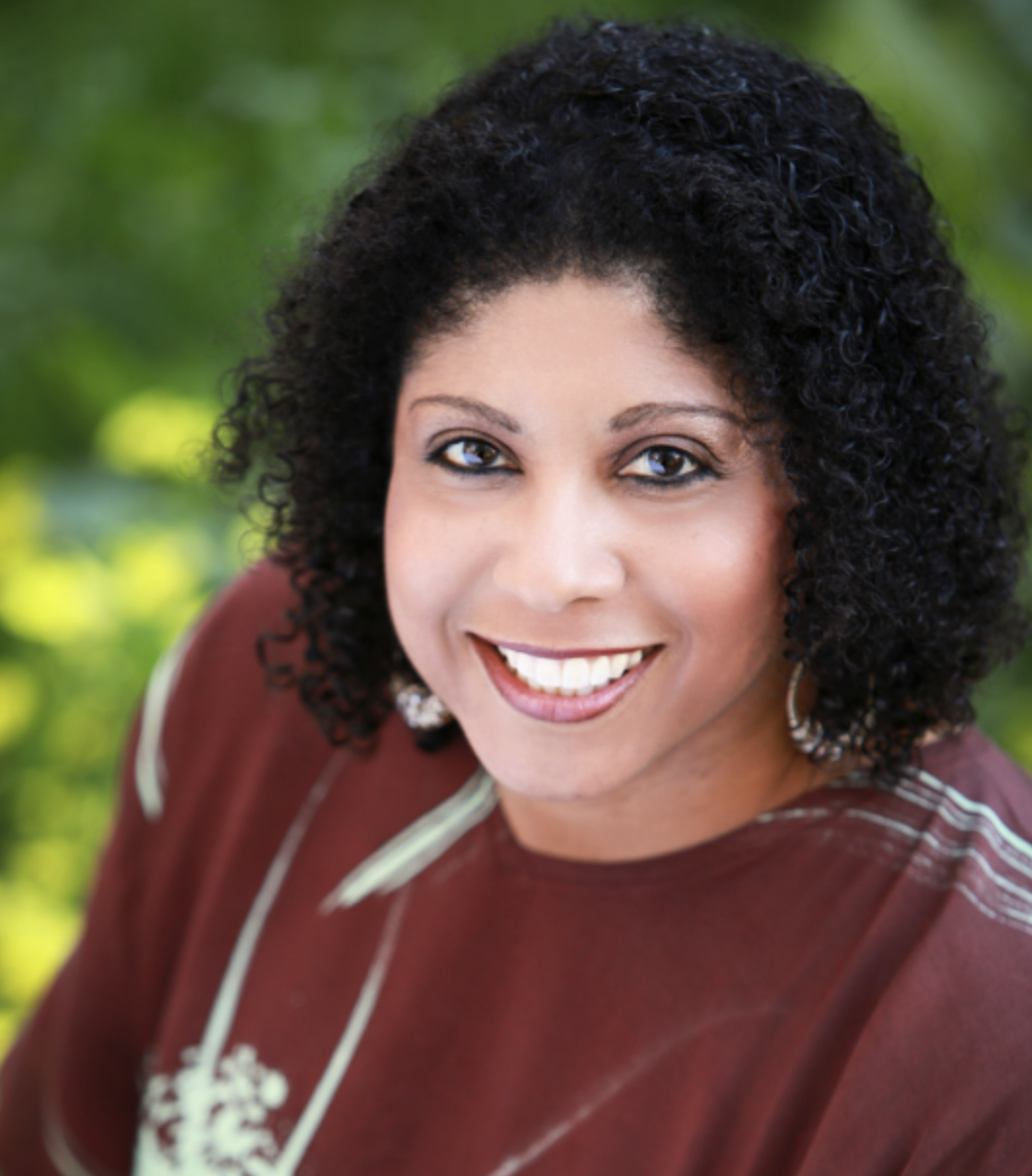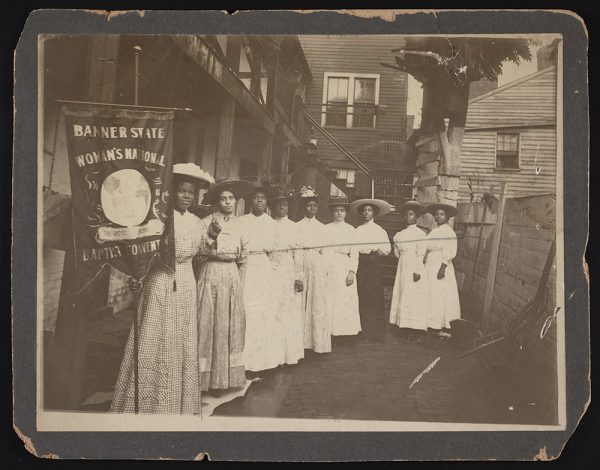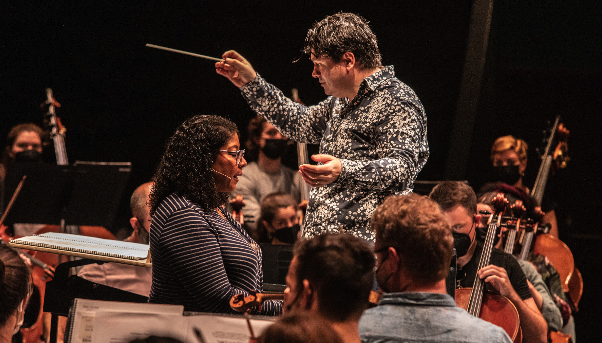In conversation with Valerie Joi:
Synergistic Inquiry and The Battle for the Ballot
By Kendall Grady

Valerie Joi is a multipotentialite: singer, choir director, pianist, composer, producer, educator, researcher, and narrator of the West Coast premiere of Stacy Garrop’s The Battle for the Ballot, commissioned by the Cabrillo Festival of Contemporary Music to commemorate the 100th anniversary of the 19th Amendment. The work received its first hearing as part of the Cabrillo Festival’s 2020 Virtual Season, and now will be performed in person by the Cabrillo Festival Orchestra, conducted by Cristi Măcelaru, on Saturday, July 30, at 7pm at the Santa Cruz Civic Auditorium.
Although I promised myself I would refrain from making any hackneyed puns, I can’t resist the truth: Valerie Joi is a joy. She works with generosity, illumination, and empowerment—a heart opener for everyone touched by her music as a rigorous practice of spiritual and social transformation.
In the Ethics, 17th century Dutch philosopher Baruch Spinoza advocates for an ethics of joy capable of creating the conditions for everybody, and every body, to realize their best possible lives. Such an ethical system is not based on the judgment of good or bad as quantifiable, objective principles, but rather on increases or decreases in empowerment, which present on a qualitative, emotional register. Spinoza scholar Andrew Youpa explains that while increases or decreases in empowerment may produce actions to which we attach goodness or badness, Spinozan joy is an essential, aspirational force in excess of our value interpretations. It is a desire—a possibility space—for bringing ourselves and others more joy. It is a very “If you build it, he will come” kind of ethics.
Valerie Joi is a builder, an architect of possibility space for an ethics of joy. “I perceive music as a tool and as a connector,” Joi says. “I utilize music in everything that I do.” And she does a lot, most recently in creating openness and reciprocity with Garrop and the historical figures in The Battle for the Ballot. For Joi, it’s all about “finding a common context” for a work. Joi describes music’s technical elements such as harmony and melody as social vectors that activate our humanity. “If I’m the narrator, music is the story,” she says. While inspired by the past, the story of The Battle for the Ballot resonates with Joi personally and well as being what she calls “performance with purpose.” The right to vote “is a really big deal that we cannot take for granted,” Joi reminds me.
The Battle for the Ballot montages historical quotes and textual excerpts by women from Black and white communities (Jane Addams, Susan B. Anthony, Carrie Chapman Catt, Carrie W. Clifford, Frances Ellen Watkins Harper, Adella Hunt Logan, and Mary Church Terrell) who emerged as leaders in the U.S. suffrage movement, which began in the mid-19th century and ended with the ratification of the 19th Amendment in 1920. “It’s an act of weaving that speaks to the importance of the voting period—what can be accomplished if everyone expresses their voice for the good of all,” Joi explains.

Although united by its desire for progress and democracy, contributions by the movement’s Black members were often hindered or ignored. The National American Woman Suffrage Association, for example, barred Black women from attending their conventions, and suffrage marches were often segregated. In response, Black activists founded organizations such as the National Association of Colored Women (1896) and the Alpha Suffrage Club of Chicago (1913) to create safer, more productive spaces that often addressed civil rights and women’s suffrage as interrelated issues, an element missing from the movement’s foregrounding of white, often affluent constituents. This intersectional stance (to use a term coined by activist and critical race theorist Kimberlé Crenshaw) honors the complexity of identity along entwined lines of gender, race, and class—a stance shared by The Battle for the Ballot.
As a contemporary audience, we receive the text Joi narrates as, on one hand, a reconstituted whole that seeks to recuperate the words of women suffragists with equal merit. On the other hand, the text is an aggregate that acknowledges the fractures within the suffrage movement and the obstacles that Black women in particular were forced to overcome. “In our wholeness there is complexity,” Joi responds when I ask how she approaches the charged history represented in Garrop’s composition. “We have to take into consideration all the voices, all the different sides, all the great and all the not-so-great, because that is the reality of the whole.” And it is a reality faced by feminists today—feminist positions around police brutality, indigenous land rights, socialist labor movements, and abortion law, to name just some platforms—who continue to encounter divisions in ideology and lived experience. “Some of it is ugly,” Joi says, “and we have got to be comfortable enough to deal with the ugly instead of telling some other imagined story that’s not reflective of all voices.”

The importance of holding space for both ugliness and beauty, discomfort and joy in order to provoke change—a project I’m inspired to see as kindred to a Spinozan ethics of empowerment—is central to Joi’s musical philosophy. Joi is currently a Ph.D. candidate in Transformative Studies at the California Institute of Integral Studies. Her research focuses on music as a tool to deepen cultural humility and cross-cultural communication using Synergistic Inquiry, a methodology for active transformation through learning. Synergistic Inquiry has been applied in the contexts of mindfulness practices, conflict resolution, teambuilding, organizational development, and community organizing; Joi distills its four phases—self-knowing (deeping awareness of one’s own consciousness); other-knowing (cultivating awareness of other consciousnesses); differences-holding (strengthening the ability to hold different consciousness as equals); and differences-transcending (creating new consciousnesses)—and explores these phases in musical collaboration with five different artists from five different backgrounds working in five different modes: a Lebanese vocalist; an Afrobrazilian dancer, singer, and percussionist; a white American acapella singer; a Congolese guitarist; and a Hatian French video producer. “My question,” Joi says, “is what can I learn?”
Joi and each of her collaborators begin their synergistic inquiry by developing a work of music from a place of self-centeredness and peace. Joi and her collaborator then exchange works, learn one another’s works, and finally, perform these works together. Through this intimate process, Joi seeks to transcend differences by creating something new: new music, new relationships, new frameworks for understanding without judgment, new possibilities for empowerment. Over the course of her research, “I have come to a greater appreciation for our complexities,” Joi says. “We’re not a monolithic people—no culture is monolithic.”
Joi’s research exceeds academia to influence the way she guides her own life with radical love as an inseparably political and spiritual initiative. Joi grew up in the Christian church. Her parents met in church, and she shares with them a long lineage of educators, ministers, and gospel singers. “I don’t care what you call that vastness [God or otherwise], I really just want you to connect with it in your own way; I’m here to encourage,” Joi says. While serving as the founding music program director for Inner Light Ministries in Santa Cruz, Joi encouraged the predominantly white Inner Light Choir to deepen its consciousness and grapple with racialized differences. With help from a white ally learning lab, the members of the Inner Light Choir engaged with spirituals arranged by Roland Hayes and Jacqueline Butler Hairston. “I had to know that the music would be respected,” Joi said. “That journey took everyone to vulnerable places,” and to Carnegie Hall, where Inner Light joined a gospel choir of over 300 members from across the U.S. to perform in celebration of 2012’s Black History Month.
For Joi, the path to inner light includes all the stops we make along the way in our efforts to hear other perspectives and work together. Experiencing The Battle for the Ballot is an exercise in learning how to place our own identity formations in conversation with power structures present during women’s suffrage, as well as current struggles for social transformation, in order to cultivate empathy and enact change. This can include confronting power dynamics around our own elective affinities as well as false constructs of social limitations often placed upon us. As U.C. Santa Cruz’s Porter College faculty fellow and choir director, Joi’s courses included hearing impaired and blind students. “There is no amount of book learning that can teach you the kind of experiences they had,” Joi says of her classes learning to work together to empower the education of all their members. Joi is also renowned among her students for inviting them to write—and share—deeply personal responses to the compositions they study in order to create sites of reciprocity with the music and each other. Learning this, I’m moved to think of distinguished author and scholar bell hooks, who describes her pedagogy as the creation of contact zones, or nonhierarchical spaces of discovery that privilege embodied modes of knowing such as emotion, experience, and social activism (Teaching to Transgress: Education as the Practice of Freedom).
Joi also practices what she teaches, and embodying the polyvocal text of The Battle for the Ballot begins with transforming her inner light as well. “When composing, the songs are always about personal journey,” Joi says. To prepare for her narrational role, Joi read, listened, watched video performances, and spent time connecting with Garrop. Joi needed to learn about Garrop’s process of identifying with her composition’s particular suffragists; to understand the stakes of representing Black women activists; and to feel that the music’s message is inclusive. “I believe the connection is heart to heart, it’s not just ear to ear,” Joi explains. The words have to mean something.
One of the quotes in The Battle for the Ballot comes from Susan B. Anthony: “Seek first the kingdom of the ballot, and all things else shall be given thee.” Here, Anthony gestures at Biblical language to position the right to vote as a promised land for women. Heard today, however, this quote also exposes how much more still needs to change in order for people from all underrepresented groups to lead just and dignified lives. I’m reminded of the words of Rev. James Cone, a founding voice in black liberation theology, who writes, “[T]he Christian gospel is more than a transcendent reality, more than ‘going to heaven when I die, to shout salvation as I fly.’ It is also an immanent reality—a powerful liberating presence” (The Cross and the Lynching Tree). The Battle for the Ballot echoes Cone as well as Spinoza in its hailing of an immanent possibility space free from oppression. This is music for a people yet to come.
The Battle for the Ballot is also music rooted in forgiveness of sin, broadly understood. In light of the historical and contemporary struggles invoked by The Battle for the Ballot, as well as Joi’s TEDxBerkeley talk “Forgive Again,” I ask Joi to elaborate on the role that forgiveness plays in the healing power of music. “First of all, it’s a choice,” Joi responds. “It comes in layers.… And I think when we do make that choice, we have a greater opportunity to open our hearts and minds to different ideas.” For Joi, forgiveness is a catalyst for change from the inside out, as well as from person to person and from groups to society. I think she will forgive my joyous pun on her name. In all seriousness, Joi’s multifold work embodies an ethics of empowerment that the U.S. sorely needs. I know I do.
